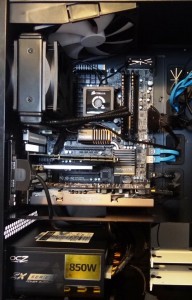BENCHMARK PROTOCOL AND THE TEST BENCH
 This is The SSD Review Test Bench Number One. A quick click on the photo will give you a better look.
This is The SSD Review Test Bench Number One. A quick click on the photo will give you a better look.
In testing, our main objective is to obtain results as pure and as accurate as possible and we want to ensure that no anomalies slip through. Simply put, we want to provide you with the absolute best results the tested hardware can provide. Repetition in testing is standard and, if necessary, we may conduct specific tests in Windows 7 ‘safe mode’ to ensure the OS has little to no influence on the end result.
In order to validate and confirm our findings, testing is supported by industry accepted benchmark programs. All results are displayed through capture of the actual benchmark for better understanding of the testing process by the reader.
 We would like to thank Gigabyte, Corsair, MSI, OCZ, and Fractal-Design, for sponsoring components of our Test Bench.
We would like to thank Gigabyte, Corsair, MSI, OCZ, and Fractal-Design, for sponsoring components of our Test Bench.
BENCHMARK SOFTWARE
Software used for testing by The SSD Review consists of ATTO Disk Benchmark, Crystal DiskMark, AS SSD, Anvil Storage Utilities, along with FutureMark PCMark Vantage.
All do a great job of showing us the numbers that we want to see, or don’t want to see in some cases, while PCMark Vantage x64 is an excellent program which recreates tests that mimic the average users activity, all the while providing a medium to measure each.
Benchmark software used by The SSD Review can be obtained by clicking on the title of each application as all may be downloaded without cost to the consumer.
 CDI does a great job of displaying supported features, including TRIM which is highlighted. CDI also gives us an idea of the drives use and, as you can tell, I have put a few hours on since first receiving the SSD.
CDI does a great job of displaying supported features, including TRIM which is highlighted. CDI also gives us an idea of the drives use and, as you can tell, I have put a few hours on since first receiving the SSD.
ATTO Disk Benchmark is perhaps one of the oldest benchmarks going and is definitely the main staple for manufacturer performance specifications. ATTO uses RAW or compressible data and, for our benchmarks, we use a set length of 256mb and test both the read and write performance of various transfer sizes ranging from 0.5 to 8192kb. Manufacturers prefer this method of testing as it deals with raw (compressible) data rather than random (includes incompressible data) which, although more realistic, results in lower performance results.
 Our ATTO results returned highs of 273MB/s read and 211MB/s write which is not that far off listed specs of 270MB/s and 235MB/s. Quite frankly, these speeds are rather impressive and much better than I thought achievable with the Phison controller.
Our ATTO results returned highs of 273MB/s read and 211MB/s write which is not that far off listed specs of 270MB/s and 235MB/s. Quite frankly, these speeds are rather impressive and much better than I thought achievable with the Phison controller.
 The SSD Review The Worlds Dedicated SSD Education and Review Resource |
The SSD Review The Worlds Dedicated SSD Education and Review Resource | 
It will be interesting add and test MyDigitalSSD 128GB to Toshiba Z830 laptop.
When do you test Samsung 256gb msata?
Still awaiting on its arrival.
Please test it in Toshiba Z830 laptop too.